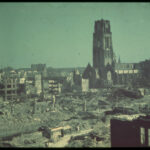Blog Post
Memories of a Jewish Dutch resistance fighter
This is my first online essay for The European Conservative as contributing editor.
By Jonathon Van Maren
There is a real possibility that My Name Is Selma: The Remarkable Memoir of a Jewish Resistance Fighter and Ravensbrück may be the last book of its kind. Selma van de Perre, born in Amsterdam on June 7, 1922, is now 98 years old. As we enter what scholars refer to as “the post-survivor era,” new memoirs from those who experienced the Holocaust and the cataclysms of World War II and the Nazi Occupation are increasingly unlikely. Selma is one of the final members of her generation, and with this autobiography she bequeaths her extraordinary experiences to us before she departs.
My Name Is Selma is a powerful, unpretentious book. It does not have the literary quality of Anne Frank’s Diary nor the moral force of Corrie ten Boom’s The Hiding Place; Selma spends little time grappling with what it all means. She simply relates what happened to her and to her family. Her father was murdered in Auschwitz; her mother and 15-year-old sister Clara were killed upon arrival at Sobibor from the Westerbork transit camp on July 2, 1943. Uncles, aunts, cousins, friends, a grandmother—all vanished into the gas chambers and mass graves and clouds of smoke billowing from crematorium chimneys.
Seventy-five years later, the destruction of her family still haunts her nights. “I have never recovered from that loss,” she writes. “There’s a devastating hole inside me that will never heal. I reconstruct what was inflicted on them in the most harrowing detail. I wonder whether Mams or Clara knew what was happening: those two sweet, innocent people who never hurt anyone. I wonder whether they held each other’s hands when they died, and I wonder if Pa thought of us in his final seconds or if he was in too much of a panic to be able to think anything at all.”
The scattered snippets of family history that Selma relates in the first chapter are a reminder that the Holocaust was designed to destroy more than people—it was intended to wipe out the very memory of a people. In some cases, the Nazis were successful. Whole families were wiped out; communities obliterated; entire societies reduced to ash. In the face of such an apocalyptic event, books like this one are still an act of historical defiance.
Even families who survived intact sometimes faced further tragedy. Selma writes that some Jewish children hidden with Dutch families became so attached to their foster families that they were traumatized when surviving family members came to retrieve them after the war. Some, to the great grief of surviving parents, chose to stay with those who had hidden them. Familial fractures and trauma lasted for generations.
READ THE REST OF THIS COLUMN AT THE EUROPEAN CONSERVATIVE








